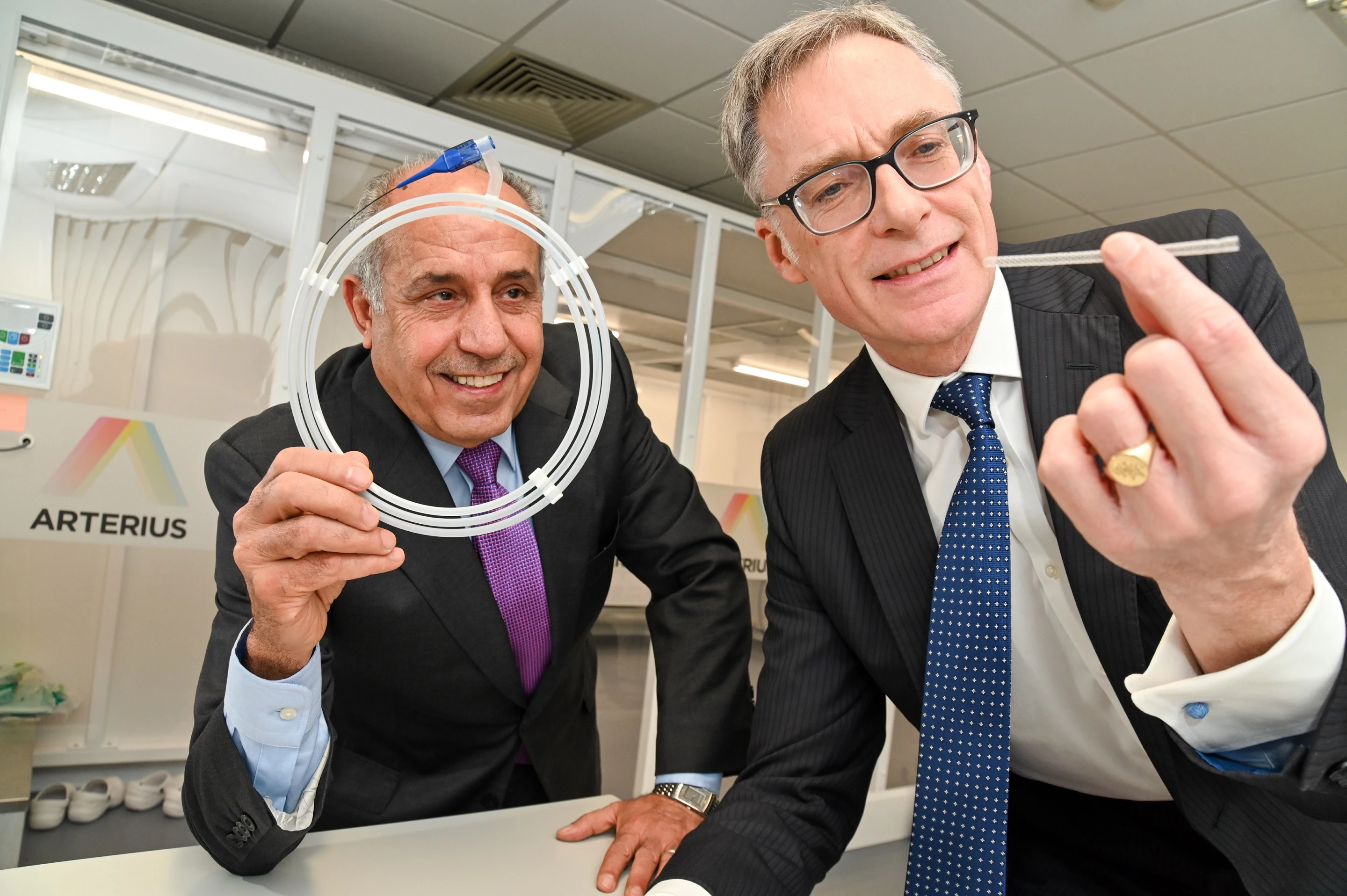
Partner Article
Pioneering stent developer to scale up research
A developer of next generation biodegradable stents that could improve the life expectancy of people with severe cardiovascular disease is to scale-up and commercialise its products.
Leeds-based Arterius was established by Dr Kadem Al-Lamee and Alistair Taylor to research and develop innovative medical devices for the £6.3bn coronary stent market.
Coronary artery disease is caused by blockages in the arteries, which limit blood flow and oxygen supply, leading to chest pain, heart attack or death.
Current treatment relies on permanent metal stents that are inserted through a balloon catheter into the blocked artery to open the blockage. However, these metal stents can lead to complications such as blood clots and long-term chronic inflammation.
The Arterius team have developed and trademarked ArterioSorb, a family of coronary biodegradable stents that can be absorbed by the body once they have performed their function.
Following the successful completion of pre-clinical trials, the company is planning to conduct First-in-Man (FIM) trials of ArterioSorb this year and will be looking for a commercial partner to take the products to market.
Arterius employs nine people at its headquarters in Lawnswood Business Park, Leeds. Last year, it secured two grants from Innovate UK to complete the FIM trials and develop next generation biodegradable peripheral stents.
Yorkshire law firm Lupton Fawcett has helped Arterius to protect its intellectual property, supporting the business through a series of collaborative research agreements and a growth capital investment from Deepbridge Capital, an Enterprise Investment Scheme (EIS) Fund.
Arterius is backed by a consortium of experts of UK academia including the Industrial Research Centre in Polymer Engineering at Bradford University, Southampton University, and Bristol University.
Dr Kadem Al-Lamee, chief executive of Arterius, has 40 years’ experience in developing medical devices.
He said: “Development funding and collaborations with the UK universities are enabling us to bring forward our ground-breaking research in the cardiovascular field for trial with a view to finding the right commercial partner. The opportunities are significant - we could help millions of patients across the world.
“We have grown significantly since we received grant funding from Innovate UK and others. This provides assurance to other potential investors.
“We can take products to clinical trial but when it comes to commercialisation we have to think carefully about licensing and finding the right partner. Our aim is to have CE-marked coronary products in the market by 2023.”
Lupton Fawcett has a specialist team of lawyers with considerable experience in guiding start-up businesses as they look to scale up their operations.
Jonathan Oxley, managing partner at Lupton Fawcett, said: “Start-up businesses are often based around innovative technology or have a new disrupting concept such as the biodegradable stents developed by Arterius. Such companies can experience rapid growth as they commercialise their innovation and this comes with its own set of challenges.
“In the case of Arterius, we have ensured their IP is fully owned and protected and have negotiated agreements around funding for the business throughout its lifetime. We look forward to offering further support as the company realises the full potential of the products it has developed.”
Medical technology has been identified as one of the key growth drivers for the Leeds City Region economy, with a range of businesses working to grow global markets and exports, while reducing healthcare costs and improving patient outcomes.
This was posted in Bdaily's Members' News section by Richard Abbott .
Enjoy the read? Get Bdaily delivered.
Sign up to receive our popular Yorkshire & The Humber morning email for free.








 Navigating the messy middle of business growth
Navigating the messy middle of business growth
 We must make it easier to hire young people
We must make it easier to hire young people
 Why community-based care is key to NHS' future
Why community-based care is key to NHS' future
 Culture, confidence and creativity in the North East
Culture, confidence and creativity in the North East
 Putting in the groundwork to boost skills
Putting in the groundwork to boost skills
 £100,000 milestone drives forward STEM work
£100,000 milestone drives forward STEM work
 Restoring confidence for the economic road ahead
Restoring confidence for the economic road ahead
 Ready to scale? Buy-and-build offers opportunity
Ready to scale? Buy-and-build offers opportunity
 When will our regional economy grow?
When will our regional economy grow?
 Creating a thriving North East construction sector
Creating a thriving North East construction sector
 Why investors are still backing the North East
Why investors are still backing the North East
 Time to stop risking Britain’s family businesses
Time to stop risking Britain’s family businesses